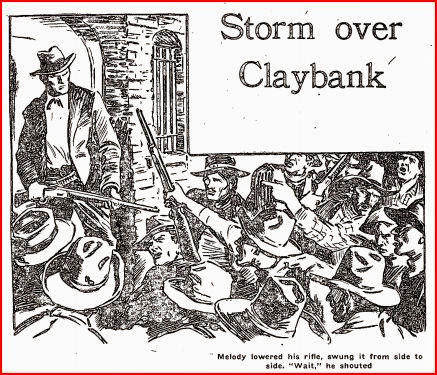

"What I can't understand is what induced all these soldiers to throw their lives away as they did. What nullified their instinct for self-preservation and induced them to come out here and die in droves like herds of butchered cattle?"
"They died for France," the girl said.
He snapped, "What did the Germans die for? The British? The Americans? What? For the Kaiser? For King and Country? For Democracy? Don't you see those are just a lot of words?
"They are ideals," the girl said quietly, "I think the thousands who gave their lives in the World War did it because they thought it would make a better world for humanity to live in.
"Who's humanity?" he gestured impatiently, "Humanity, dear lady, is you and I. Well, do we thank those fellows who bled to death out here for us? We give them two minutes of silence every year on Armistice Day -- is that gratitude? But today we're falling for the same same old stock words and blah. Shouting the same empty phrases. Sharpening our weapons to make the same old mistakes. I don't wonder the peasants around here think these dead are turning over in their graves."

This should be interesting reading in the weeks to come. As for this week, if Roscoe is plainly antiwar, Robert Carse implicitly takes the other side in his historical tale, "Puritan's Progress." His Protestant hero is rescued at sea by the French who use him against the Spaniards, and he later rescues the French from a renegade in their own ranks who allies with buccaneers to take power for himself. The moral? While Puritans or Pilgrims historically fled from oppression, at least in American history, Carse's hero learns that "A man dare not flee from ferocity and tyranny; he must face them, fight them, and conquer." As an action story, this one's all right, though it has a slightly silly climax in which the imprisoned hero takes solace by reading an old, heavy Bible until his reading gives him the arm strength to overcome his personal oppressor. We needn't read any religious significance into this, however; any big book would do for the purpose.


Argosy was one of the most prestigious pulps, one veteran authors aspired to appear in after years of effort. Yet the editors boast this week of featuring three new authors, two of whom have published nothing anywhere else before. Was this a conscious search for new blood or was it done because novice authors work cheaper? In any event, the neophyte authors are Richard Blaker, whose novelet "Senor Sleight-of-Hand" is his only pulp work (according to the FictionMags Index), George Masselman, whose "Dutch Courage" is the first of five stories to appear in Argosy between now and January 1941, and John Wiggin, a baseball specialist who had already made the slicks earlier this year in Collier's. Blaker's story details the torture of a one-armed prospector in a 19th century banana republic, climaxing with the revealtion of an unlikely deception. Whatever readers thought of the story, Blaker, who had published a novel the previous year, would die (in battle? He appears to have been British) the following year. Masselman teases the butchering of an idealistic colonial official and his girlfriend in the Dutch East Indies, only to surprise readers with a favorable native reception to their humane policies. Wiggin wrote a baseball story that I didn't bother to read. Meanwhile, veteran contributor Philip Ketchum writes "Storm Over Claybank," with one of the standard western plots: lawman must prevent a lynching. Ketchum's good enough to make it fresh. A better western is Luke Short's serial Hurricane Range, which concludes on an action-packed note this week, while MacIsaac & Harkins' dialect serial River Rogues meanders toward its conclusion next week.
Joining the serial lineup next time will be yet another "modern man wakes up in far future" story, while Ketchum comes back immediately for his latest Bretwalda tale and Donald Barr Chidsey thrills us with a man writing fraudulent checks. Add the Roscoe serial to that and it ought to be an interesting issue overall.
TO BE CONTINUED
No comments:
Post a Comment